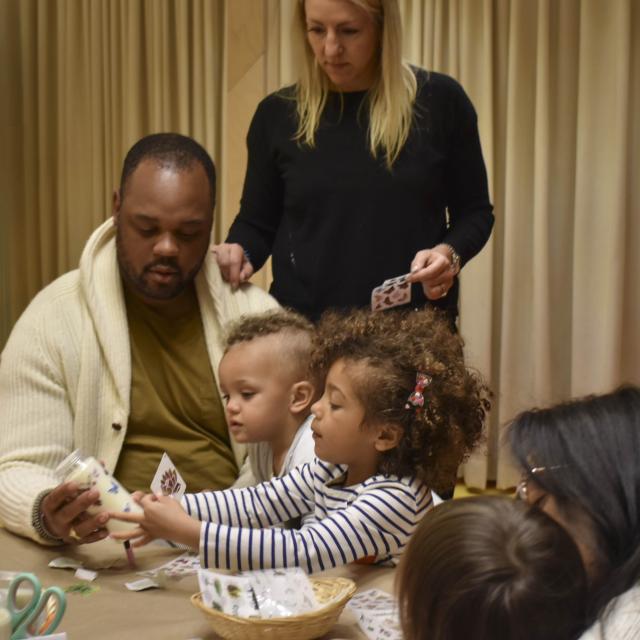Coping with Grief and Living with Loss

After a death of a loved one, you may need extra help in coping with your grief and living with your loss. We offer the following to support and guide you.
You can also download our PDF "What to do when a loved one dies" from Trinity's Uptown Cemetery and Mausoleum staff, which is is a practical guide that covers the immediate steps to take following a death.
Grief is a universal, natural, necessary, and very personal process that expresses itself in different ways for each of us. Though you may pass through stages of grief that many share, how you experience grief is unique to you, and is often unpredictable. You may be experiencing the loss of a loved one or dealing with anticipatory grief and loss of someone who is approaching the end of life. You may have the added challenge of a sudden or traumatic death of someone close to you.
The process of grieving can be very painful, and yet it can also be healing and lead to a time of renewed appreciation of life and of those we love who have passed on, and it can deepen our bonds with those still with us. How you grieve, and how the loss of a loved one impacts you, can depend on the circumstances surrounding their death, your relationship to them, your own circumstances, as well as your personal and family history, traditions, and spiritual life in coping with loss.
Family, Community, Cultural, and Spiritual Traditions
Your family, friends, culture, and for some, your community of faith, may have particular rituals or traditions for facing the end of life, sharing grief, and coping with loss that can be very helpful. Connecting with others through these traditions is an important part of grieving. But know that many people have different grief reactions, beliefs, and ways of relating to the end of life. It can be challenging to share your feelings, struggles, or needs if they don’t seem to fit with what others around you are experiencing or expecting. Seek out compassionate, non-judgmental listening and support that you are comfortable with.
Self-care
Self-care can easily be neglected when grieving. It is important during such times to maintain your own physical, mental, and spiritual well-being. Accept others’ offers of useful help and support if you are having difficulty coping with daily routines, and try to make sure to get the rest and food you need. Remember to nurture yourself and to be patient and compassionate with your own process. Some challenges you might expect while grieving:
Withdrawal/Isolation: Though you may need some time alone, notice if you are over-isolating. It is helpful to have someone you trust to stay connected to and communicate with regularly.
Difficulty concentrating: You may not be able to focus or accomplish as much as you are used to during the day. Keep expectations to what is necessary and be kind to yourself.
Trouble with daily routines: You may need extra help or extra reminders for daily routines. Try focusing on just the essentials for a while, and try not to worry if you let a few things slide.
Emotional bursts: Tears, anger, depression, or mood swings are normal grief reactions. Try not to judge yourself. Instead, seek understanding and know that healing takes time.
Sleep disturbance: Trouble sleeping can impact daily life. Make rest and down time a priority and try techniques or practices—a cup of tea, a warm bath, meditation, prayer, stretching, yoga, music, etc.—that can help you relax, let go, and aid you in getting the sleep you need.
Loss of appetite: Appetite loss is a normal reaction, but make sure you are getting enough healthy food each day to sustain yourself and accept help in the form of food/meal preparation from others.
These are all normal responses to grief and loss. Refrain from judging or admonishing yourself to “get over it” or “move on.” You may experience increased grief after all the funeral activity is over. You may have a delayed grief reaction triggered by something else, or need extra support during holidays, special occasions, or anniversaries of your loved one’s death or birthday. If your grief reactions become extreme or prolonged it is important to seek and accept help.
Self-expression
Creative activities that celebrate life or honor your loved one, such as making a memory book, art-making, or creating a personal tribute or ritual, can be healing and strengthen your spirit. This may be as simple as lighting a candle or as robust as creating a group memorial with mutual friends or family. There may be readings, practices, or prayers that you can turn to regularly for solace and sustenance. Many who are grieving find physical activity or experiences in nature to be healing and uplifting.
Your Workplace
Many find it initially difficult to focus or keep up with work routines when grieving. If you are struggling at your workplace you might seek out and accept help from supportive colleagues or someone who may have experienced a similar loss. Also see if you can take advantage of any bereavement or personal leave time available or counseling that may be offered.
Seeking Help
You may have family members or friends to turn to for support. It is also often useful to find a support group of others to openly share and empathize with different experiences. You may be experiencing delayed grief or grief that is re-triggered many months or even years after you felt you had moved on. Feel free to reach out for help again when you need it. If your grief is overwhelming, if you have experienced a traumatic loss, or if you just feel you might benefit from extra support, consider seeking out a professional counselor. If you are stuck in complicated or prolonged grief you can’t move through or is impacting your health or ability to function for an extended time, it is important to seek professional help from your doctor and/or a therapist or spiritual counselor.
Finding Resources for Coping with Grief
Online resources: Many resources can be found online, though not all may feel appropriate for you or fit your circumstances. Ask for suggestions from people you know and trust.
Poems, prayers, meditations: Look for words or practices that speak to you for solace and support.
Activities and rituals: Find simple things you can do to help you or your family when grieving.
Books and materials: There are a variety of useful resource books to be found online and in libraries. You might also find resources through family and friends, or your faith tradition.
Support groups: Ask friends and look to local hospitals, hospices, or houses of worship for referrals to support groups, gatherings, or therapists. Some groups may focus on loss of a spouse, sibling, or child, enabling you to be with others who have faced the same kind of loss.
Trinity Church Wall Street offers periodic Living with Loss support groups and other bereavement support. For more information, please contact Amiriz Sanchez at asanchez@trinitywallstreet.org.
For additional help coping with grief, you can find a recommended therapist through the Psychotherapy & Spirituality Institute (PSI).






